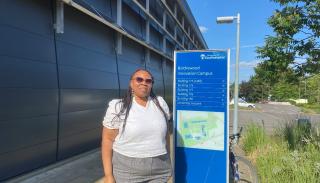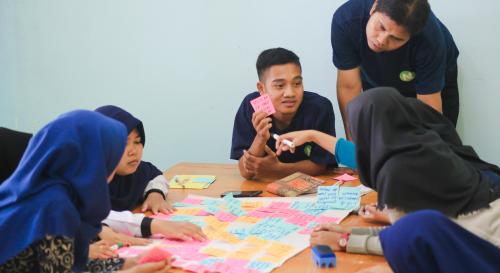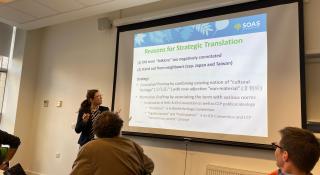
Breadcrumbs navigation
Methods Summer School - Knowledge and tools for research with vulnerable populations
BISA partnered with The Department of Politics and International Relations at the University of Southampton to launch their first Methods Summer School. Some students were provided with BISA bursaries to attend, including Margaret Ifeoma Abazie-Humphrey, who now discusses valuable takeaways and highlights from the course.
Thank you, BISA, for funding my participation in the PAIR Methods Summer School at the University of Southampton (23–24 June 2025). As I prepare to undertake my fieldwork, the course has equipped me with additional knowledge and tools to research with vulnerable populations. My research focuses on the child soldiers’ reintegration lived experiences in Nigeria. Importantly, I am an insider researcher involved in a Nigerian disarmament, demobilisation, and reintegration (DDR) project that I have worked on for ten years. The school’s methods clinic helped me explore one of the dilemmas I am likely to face during my upcoming data collection in Nigeria. For example, having previously worked on the reintegration project at a senior level before starting my doctoral studies at the University of Bristol, I have often wondered about the Nigerian norm of 'answering questions with questions', which is common in social gatherings. For instance, my participants may respond to my questions by saying, “Madam, you know these issues you are asking us to talk about,” and I have considered how to respond to them diplomatically. Professor Liz Evans advised me to consider the initial interactions by “telling your participants, I know that you may think that I know the answers to these questions that I may put forward to you, but I would like you to tell me in your words and experiences about your encounters, as this is the purpose of this research.” The methods clinic helped resolve my research dilemma and provided strategies for understanding the individual agency of my research participants within Nigerian interactive norms.
Another interesting part of the programme was the session on research impact. This session was strategic, as I plan to remain in the practice and policy field after graduation. It offered valuable insights into how to keep my research aligned to make a difference in DDR practice and promote real-world change in the reintegration experiences of child soldiers in Africa. It shaped my understanding that my research output aims to foster a sense of responsibility to act among practitioners in peacebuilding, even if it may not necessarily lead to a change in DDR policy. Additionally, Professor Pia Riggirozzi emphasised that I must take notes during fieldwork, even if they are not related to my current research, as such notes could potentially trigger another research project later in my career. Similarly, Professor Rob Johns insists, “every information is important in research. Allow interviewees to keep talking as they may be valid in another analysis.” He emphasised the importance of not interrupting your interviewee during their discussion. Again, Professor Riggirozzi reminded us to exercise caution with our dress code when researching with vulnerable communities - for example, you do not need to dress ostentatiously or wear jewellery, as that may be perceived as disrespectful to marginalised communities experiencing poverty. I like jewellery, and this guidance is very insightful for my fieldwork daily routines. I will apply these insights as I conduct data collection in Nigeria and feel much better prepared to face potential fieldwork challenges.
Additionally, the summer school gave me the opportunity to visit Southampton and meet the lovely staff who tutored us with great enthusiasm and openness. We also received advice on how to structure the methods chapter of our thesis, as well as on selecting our examiners.
Finally, the summer school arrived at a crucial time. I lost my elder sister on Friday 20 June 2025 in Nigeria, and was overwhelmed with deep emotional distress as I am alone in Bristol. The trip to Southampton was a great relief from my sadness and tears, providing a different environment. Once again, I would like to extend my gratitude to the BISA team for giving me this opportunity.


